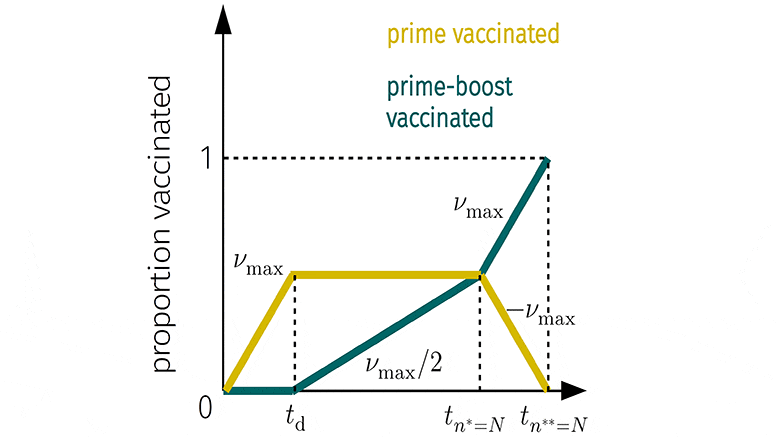When Is One Dose Better Than Two?
0 View
Share this Video
- Publish Date:
- 22 October, 2021
- Category:
- Covid
- Video License
- Standard License
- Imported From:
- Youtube
Tags

The number of people vaccinated once (yellow) and twice (green) in the prime first and prime boost scenarios. Prime first initially vaccinates double the number of people, while prime boost focuses on complete vaccinations. Credit: Lucas Böttcher and Jan Nagler
Under certain circumstances, vaccinating more people with a single dose slows the spread of the virus.
In many parts of the world, the supply of COVID-19 vaccines is lagging behind the demand. While most vaccines are designed as a two-dose regimen, some countries, such as Canada, have prioritized vaccinating as many people as possible with a single dose before delivering an additional dose.
In Chaos, by AIP Publishing, researchers from the Frankfurt School of Finance and Management and the University of California, Los Angeles illustrate the conditions under which a prime first vaccine campaign is most effective in stopping the spread of COVID-19 -virus.
The prime first campaign does not suggest that people should receive just one dose of the vaccine. Instead, the emphasis is on vaccinating large numbers of people as soon as possible, then doubling up to give second doses. In comparison, the “prime boost” vaccine campaign prioritizes fully vaccinating fewer people.
Immunologically, the prime boost scenario is always superior. However, in supply constraints, the benefits of vaccinating twice as many people may outweigh the benefits of a double dose.
The scientists simulated the transmission of COVID-19 with a susceptible, exposed, infected, recovered, deceased model. Each of these disease states is associated with a compartment of individual people. Transitions between compartments depend on disease parameters such as virus transmissibility.
Each compartment is further subdivided to account for unvaccinated, partially vaccinated and fully vaccinated individuals. The researchers measured how each vaccine group compared to the others under different conditions.
“We have a huge amount of uncertainty about the parameters of COVID-19,” said author Jan Nagler. “We recognize that we don’t know these precise values, so we take samples across the parameter space. We give a nice picture of when prime first campaigns are better at saving lives than prime boost vaccination.”
The team found the dwindling number of vaccines a critical factor in the decision. If the decline or decrease in vaccine effectiveness is too strong after a single dose, the double dose vaccination strategy is often the better option.
However, the vaccine strategy changes as the rate of decline after a single dose is more similar to the rate of decline after a double dose.
“Our results suggest that better estimates of waning immunity are important in deciding whether prime first protocols are more effective than prime boost vaccination,” said author Lucas Böttcher.
As the scientific community gathers more data on COVID-19 vaccinations, the scientists hope this model will become more informative for public health experts and politicians who have to decide for or against a particular vaccination protocol.
Reference: “Decisive Prerequisites for Strategic Vaccination Against SARS-CoV-2” by Lucas Böttcher and Jan Nagler, Oct. 20, 2021, Chaos An Interdisciplinary Journal of Nonlinear Science.
DOI: 10.1063/5.0066992










